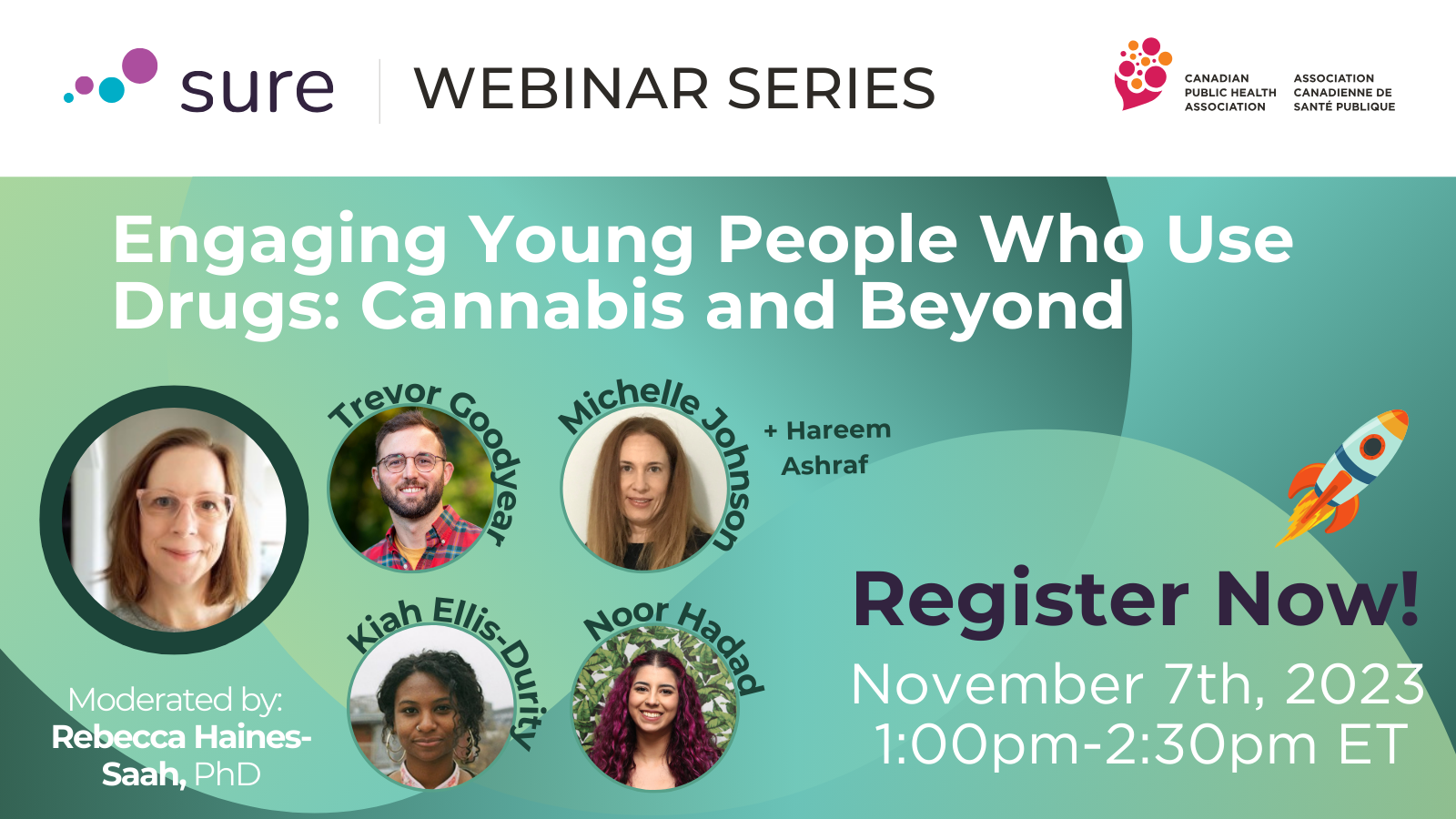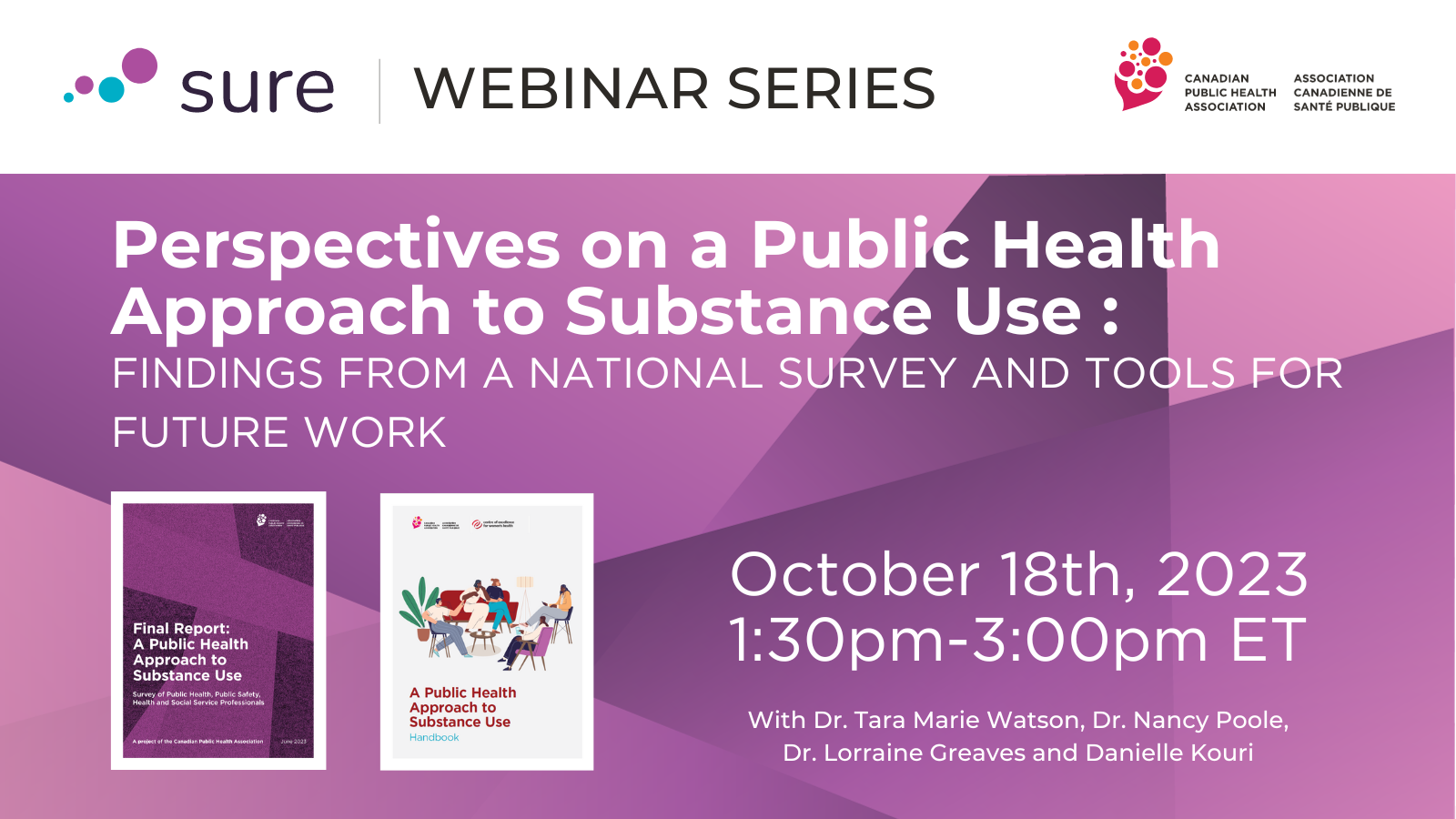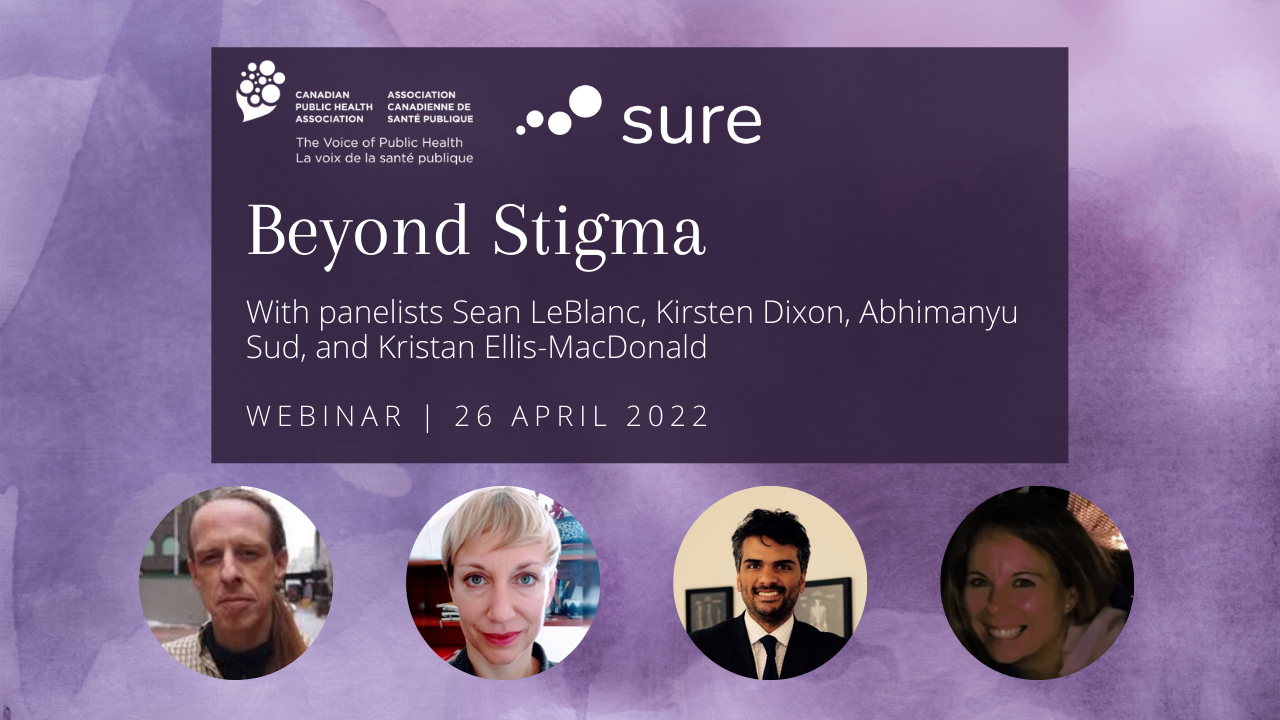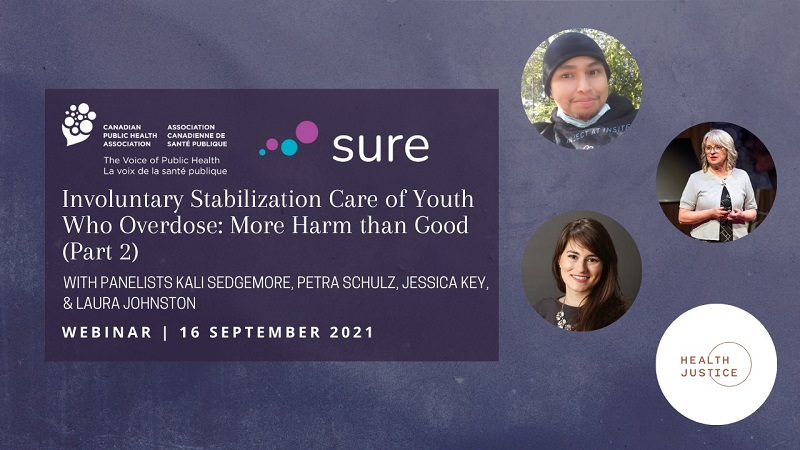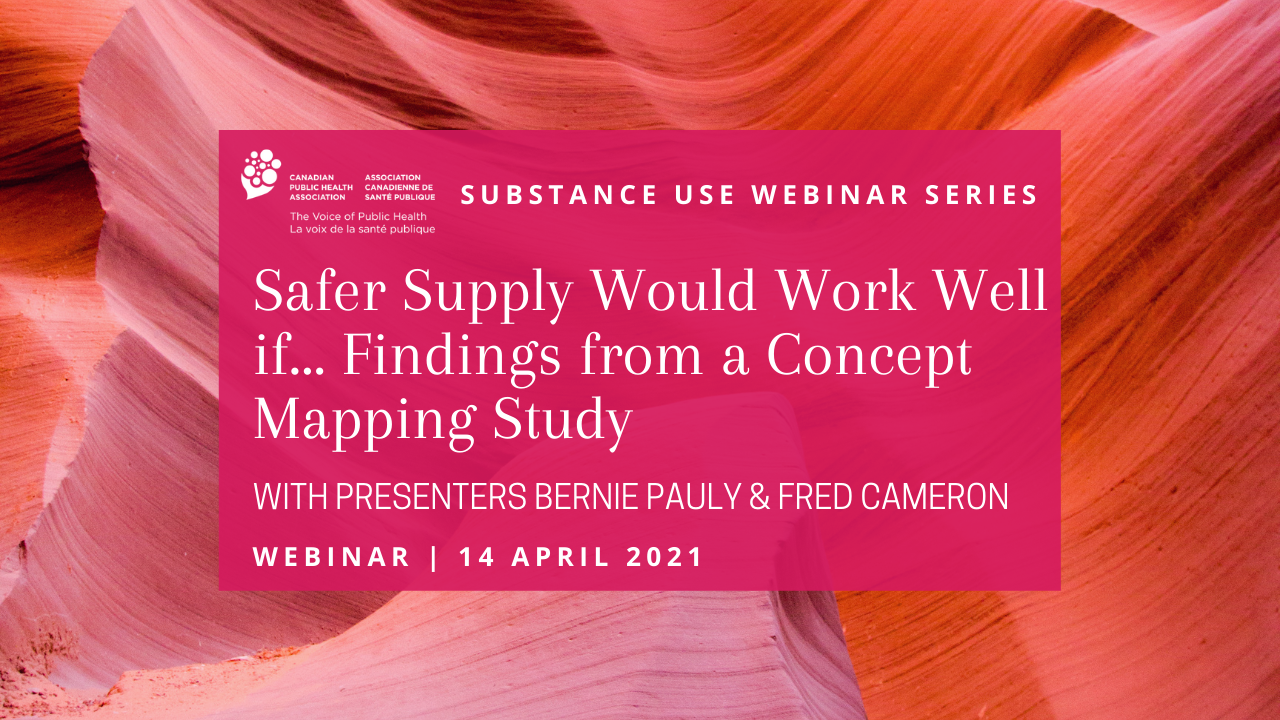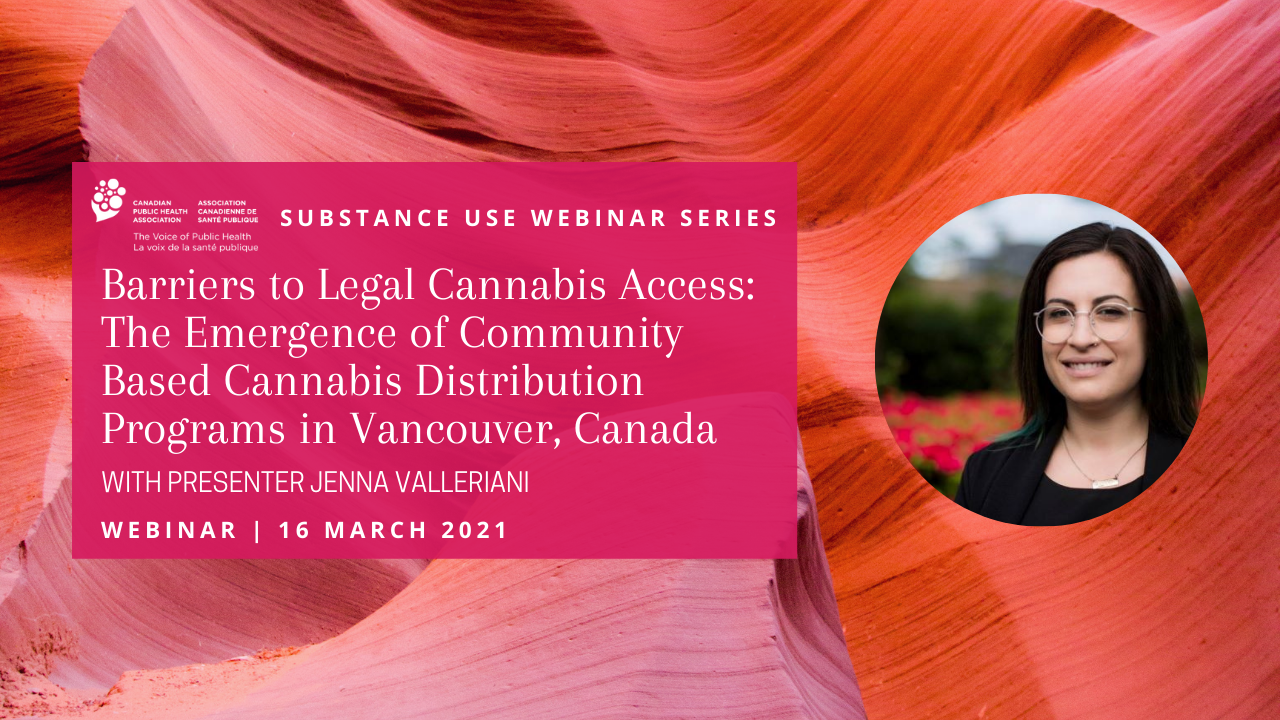Join us for our webinar series as we discuss current and emerging topics in substance use. This series is primarily intended for professionals working to protect and promote the health, wellness, and safety of people who use substances.
If you have suggestions for topics you’d like to learn more about, share them with us using our Contact Us page.
In January 2020, CPHA was funded by Health Canada to build professional and community capacity to implement a public health approach to substance use. Defining such an approach was a necessary first step. The resulting policy statement provides an overview of what CPHA endorses as a public health approach to substance use across the full range of legal and currently illegal psychoactive substances. Presenters discussed the process followed to develop the framework and the principles embodied in a public health approach. While it is anticipated that the framework will evolve over time, organizations that work with people who use substances are encouraged to consider adopting the framework.
This session brought together a panel of speakers to showcase projects, resources, and tools centered around engaging youth and young people who use cannabis and other drugs. Presenters spoke to the barriers that young people who use drugs (YPWUD) experience in healthcare settings, challenges and opportunities in engaging YPWUD and provide insight into how clinicians and service providers can better serve or engage these groups. This webinar was designed for professionals, educators, policymakers, healthcare providers, community leaders, youth workers, and anyone interested in promoting constructive conversations and services for young people who use drugs, with a focus on cannabis and its wider context.
Watch the recording to:
- Hear voices from the field and youth perspectives,
- Learn about the impact of stigma on the experiences of YPWUD in healthcare settings
- Support YPWUD in making informed choices about their substance use.
Moderated by:
Rebecca Haines-Saah, PhD is an Associate Professor in the Department of Community Health Sciences, Cumming School of Medicine, University of Calgary. She is a public health sociologist, with a PhD (2008) in Behavioural Health Sciences and Addiction Studies from the University of Toronto. Her research interests are in public health and harm reduction approaches to substance use and drug policy reform. Her recent projects have focused on youth and young adult cannabis use and opioid use, the family contexts of substance use, and parent advocacy for action on Canada’s overdose death emergency.
Presentations by:
- Trevor Goodyear (he/him), RN, MSN, MPH is a registered nurse and PhD candidate in the School of Nursing at the University of British Columbia. His research is in youth mental health and substance use, with a focus on work with youth experiencing overlapping structural inequities. For Trevor’s dissertation, he is using participatory photography methods to examine the intersection between homelessness and substance use among 2S/LGBTQ+ youth. Alongside this work, Trevor is an active member of the TRACE Youth Cannabis Research Program.
- Michelle Johnson (she/her), R.N., BScN, BSc.AT has been a Public Health Nurse for 23 years. She has worked in many areas of Public Health including Control of Infectious Diseases, Child and Family Health and the Healthy Living division where the focus has been on working with children and youth in the areas of mental health, physical activity, substance use including opioid and cannabis education and most recently on concussion awareness and prevention.
-
Hareem Ashraf, BScN, BSc graduated this September with an Honours Bachelor of Science in Nursing from York University and previously received an Honours Bachelor of Science in Mental Health Studies from the University of Toronto. She works in various roles including writing, research, leadership, and mental health advocacy. She is passionate about increasing access to mental health resources and support within community settings.
-
Kiah Ellis-Durity (she.they) is a Co-Project Manager for Get Sensible, a project by Canadian Students for Sensible Drug Policy. Kiah studied Comparative Religion and Political Science at Concordia University. They have been involved in several harm reduction initiatives, working with organizations like CSSDP, The Heart Tattoo Society, Tides of Change - Community Action Team, and The Cannabis and Mental Health Project. Kiah ensures their work is rooted in community, whether it is regarding harm reduction, drug policy reform, housing, food justice or social wellness. She aims to continue her work in reducing barriers around drug education and harm reduction. In their free time Kiah likes to nap, play rugby, and felt.
- Noor Hadad (she/her) is a substance use and mental health advocate, focusing on harm reduction and recovery, drawing from her own lived experience. She earned her B.A. (Honours) in Psychology from the University of Calgary, and currently works as the Research Coordinator for a program on campus supporting students and staff with substance use concerns. Noor is also one of the Project Leads with Get Sensible, a national campaign on youth drug education, part of Canadian Students for Sensible Drug Policy.
This Fall, the Subject Matter Health Research Lab released the third video in their series on reducing opioid related stigma, Beyond Stigma: Strength in Connections. This video was developed to highlight the stigma that may be experienced from or by the families, friends, and peers of people who use opioids and can be of value to healthcare professionals, public health professionals, peer supporters and other social service providers, and people with lived/living experience of opioid use. Accompanying this video is a discussion guide that can support individual reflection or prompt group discussion using specific questions and activities.
Watch this webinar for a livestream of the third video followed by a discussion with some of its creators to learn about the impacts of stigma for families, friends, and peers of people who use opioids, and ways we can move beyond it.
Panelists:
- Abhimanyu Sud (he/him) is a physician and health services researcher based in Toronto, Ontario. He is an Assistant Professor at the Temerty Faculty of Medicine at the University of Toronto and Research Chair, Primary Care & Population Health Systems at Humber River Hospital. His clinical, research, education, and advocacy work focus on the complex intersections of chronic pain, mental illness, and opioid use.
- Sean Patenaude (he/they) is an artist, educator and mental health advocate who has worked at CAMH since 2014 in roles focused on restraint reduction, patient safety, and incident management. He is a graduate Fellow of LET(s) LEAD, Yale University’s Transformational Leadership Academy. Sean has served as faculty on CAMH Education’s Opiate Agonist Treatment training program, is a member of the Canadian Research Initiative in Substance Misuse (CRISM) and has been a guest lecturer at the Leslie Dan Faculty of Pharmacy and the Mad Studies program at the University of Toronto.
- Angie Hamilton (she/her) is a retired lawyer, the Executive Director and Co-Founder of Families for Addiction Recovery (FAR) and the parent of a child who struggles with addiction. Angie is a member of the Policy Committee of the Canadian Society of Addiction Medicine and a Board Member of The Ontario Family Caregivers’ Advisory Network. She was a member of the National Board of MADD Canada from 2014 to 2020 and the Chair of their Public Policy Committee
- Jacqueline Myers (she/her) is a pharmacist in Regina and has practiced in various clinical settings including community pharmacy, long-term care, and within the Saskatchewan Health Authority in the areas of internal medicine and opioid stewardship. Jackie currently provides care for people living with HIV as well as substance use disorders and delivers education to primary care clinicians with RxFiles Academic Detailing Service. Her passion is working with marginalized populations and helping other clinicians provide compassionate care. When Jackie is not with patients or health care providers, she enjoys running, traveling, and spending time outdoors with her two pups.
- Pauline Ingber (she/her) has been a Public Health Nurse at the Regional Municipality of York, since 2001. Her current work includes the development & collaboration on the Opioid Action Plan for York Region and co-chairs the stigma reduction group of the Community Opioid Drug Response Collaborative. This group of community agencies is working together to decrease stigma, harm and marginalization of people using opioids by sharing information and providing education in order to increase awareness and appreciation that, opioid and substance use must be addressed as a health and social issue. Pauline also works with other committees and groups to reduce stigma and harms and provide prevention strategies related to substance use in York Region. When not at work, Pauline enjoys time in nature, hiking, traveling to new places and spending time with family and friends.
- Kirsten Dixon (she/her) graduated from the School of Medicine at Queen’s University in 2006 and completed her residency in Family Medicine through St. Michael’s Hospital at the University of Toronto. Dr. Dixon’s clinical work is focused on the care of people experiencing homelessness, mental illness and substance use disorders. She works with a shelter-based outreach team through CAMH and was the Lead Physician with Inner City Health Associates for Seaton House men’s shelter from 2017 to 2020. Since 2015, Dr. Dixon has worked with the Safer Opioid Prescribing Program at the University of Toronto on course development and facilitation. She is dedicated to enhancing education on opioid use disorder and to improving the quality of care delivered to people who use opioids.
CPHA’s Normalizing Conversations project launched a survey in 2021 to learn how Canadian public health, public safety, and health and social service professionals define and implement a public health approach to substance use. The survey findings provide an understanding of key stakeholder beliefs, attitudes, knowledge levels, and access to information about substance use.
To support the implementation of a public health approach, CPHA partnered with the Centre of Excellence for Women’s Health (CEWH) to create and publish the Public Health Approach to Substance Use Handbook. This resource describes and illustrates the key principles of this approach, with relevant tools for future work.
In this webinar, CPHA, Dr. Tara Marie Watson, Dr. Nancy Poole, Dr. Lorraine Greaves, and Danielle Kouri from the project’s Expert Reference Group explore perspectives on a public health approach to substance use and discuss its challenges and opportunities for implementation.
Dr. Tara Marie Watson (she/her), earned her PhD in Criminology and Sociolegal Studies at the University of Toronto. Her longstanding research interests include drug policy, harm reduction, and community- and prison-based substance use and mental health services. She is an interdisciplinary researcher with years of experience in knowledge translation and dissemination. Dr. Watson is currently the Associate Director of the Research Program at the University of Toronto's Temerty Faculty of Medicine, Department of Family and Community Medicine.
Dr. Nancy Poole (she/her), PhD is the Director of the Centre of Excellence for Women’s Health, a research and knowledge exchange centre hosted by BC Women’s Hospital and Health Centre. In that role she leads network development, research and knowledge exchange related to improving policy and service provision on gender and women’s health. In 2021 Nancy was awarded an honorary doctorate by the Justice Institute of BC in recognition of her contributions to women’s health, including trauma-informed practice and the treatment of substance use and addiction.
Dr. Lorraine Greaves (she/her), PhD is a medical sociologist and Senior Investigator at the Centre of Excellence for Women’s Health in Vancouver, and its founding Executive Director. She has worked in academic, government, education and NGO settings in British Columbia and Ontario. She is a Clinical Professor in the Faculty of Medicine at UBC and an expert in sex, gender and tobacco, cannabis, alcohol, substance use, violence, and trauma. She focuses on the development and integration of sex and gender science, and SGBA+ in research, care, health promotion and policy. She is Chair on the Scientific Advisory Committee on Women’s Health Products, and previously a member of the Scientific Advisory Committee on Vaping Products.
Danielle Kouri (she/they), B.Soc.Sc is the Outreach Coordinator at St. Leonard’s Society of Canada (SLSC), a national charitable organization dedicated to promoting humane and informed criminal and social justice policy and practice. She is particularly passionate about supporting the work of halfway houses, the community reintegration of people exiting prisons, and amplifying the voices of people with lived experience of justice system involvement. Danielle has an Honours Bachelor of Social Science in Criminology from the University of Ottawa. She is also part of a volunteer group that supports individuals serving life sentences in both a maximum and a medium security institution.
As controversy surrounding the Mobile Overdose Prevention Site (MOPS) launched by Sunshine House has demonstrated, interplay among community need, effectiveness of interventions, public opinion and political ideology about Supervised Consumption Sites (SCS) is intense. Even as the toxic drug overdose crisis persists and worsens in the province, Manitoba is one of few provinces that lacks a evidence-based, peer- and community-led SCS program as part of a comprehensive harm reduction strategy. In fact, the province has recently introduced Bill 33 – the Addictions Services Act – which many in the harm reduction community recognize as a step backward that will threaten the ongoing success of the current Mobile Prevention Site and prevent any future Supervised Consumption Sites from opening. In this session, panelists examined the experience and evidence regarding SCSs in Manitoba, explored how collaboration among community, public health, academia, and government can contribute to policy change in the province.
Organized by the Department of Community Health Sciences, University of Manitoba and the Manitoba Public Health Association.
In April 2022, the Canadian Public Health Association and the Canadian Substance Use Resource and Knowledge Exchange Centre (SURE) presented a panel discussion entitled ‘Beyond Stigma’. The webinar centered around the Subject Matter Health Research Lab’s 2022 animated video ‘Beyond Stigma’, and featured a conversation with some of the videos creators on the realities and impacts of opioid related stigma, and ways that we can move beyond it. This is part of CPHA’s Substance Use Webinar Series.
Kirsten Dixon (she/her) graduated from the School of Medicine at Queen’s University in 2006 and completed her residency in Family Medicine through St. Michael’s Hospital at the University of Toronto. Dr. Dixon’s clinical work is focused on the care of people experiencing homelessness, mental illness and substance use disorders. She works with a shelter-based outreach team through the Centre for Addiction and Mental Health and was the Lead Physician with Inner City Health Associates for Seaton House men’s shelter from 2017 to 2020. Since 2015, Dr. Dixon has worked with the Safer Opioid Prescribing Program at the University of Toronto on course development and facilitation. She is dedicated to enhancing education on opioid use disorder and to improving the quality of care delivered to people who use opioids.
Sean LeBlanc (he/him) left an abusive home situation in the Maritimes at age 13 and eventually put himself into university where the loss of his pregnant partner started a decade long run of addiction and homelessness. Sick and tired of being sick and tired he used his stubbornness and desire for positive change to eventually found a non-profit to advocate for drug users in Ottawa called DUAL, the Drug User Advocacy League in 2010. He spent years as a front line worker at Ottawa Inner City Health, and is now a Research Assistant and consultant with Mount Sinai, St Mike’s and a proud CAPUD (Canadian Association of People who Use Drugs) and ONPUD (Ontario Network of People who Use Drugs) board member. He is a huge Red Sox fan, and loves punk rock, harm reduction, bass guitar and his partner Catherine.
Kristan Ellis-MacDonald (she/her) is a Family Nurse Practitioner in the First Nations community of Wagmatcook located in Cape Breton, Nova Scotia, where she has practiced for 3 years. Prior to this role, Kristan greatly enjoyed working as an NP in a rural community located in Northern British Columbia where a large part of her patients were of First Nations ancestry. Prior to her career as an NP, she worked as a Registered Nurse and specialized in vascular, general surgical, neurosurgical, and critical care ICU in Halifax, Nova Scotia. After being away from home for so long, she is happy to be back working where she was raised in Cape Breton and grateful to give back to the surrounding communities.
Abhimanyu Sud (he/him) is a family physician based in Toronto, Ontario. He is an Assistant Professor at the Temerty Faculty of Medicine, University of Toronto and Research Chair of Primary Care & Population Health Systems at Humber River Hospital. His clinical, research, education, and advocacy focuses around the intersections of chronic pain, mental illness, and opioid use.
In February 2021, the Harm Reduction Nurses Association and CPHA presented a webinar on proposed amendments to British Columbia’s Mental Health Act that would allow for involuntary, hospital-based stabilization care of youth following an overdose (Bill 22), and discussed the potential harms and disproportionate impacts Bill 22 could have on youth and ethical issues associated with detention-based treatment. This follow-up panel discussion broadened the discussion to include additional perspectives from youth, families, advocates and academics. The presentations and discussion highlighted a range of perspectives on involuntary stabilization care and shared insights on efforts to support youth who use drugs.
Laura Johnston (she/her) is a lawyer who has worked primarily in the areas of mental health law and human rights, representing clients with many different forms of mental disabilities and substance use issues. She is currently the Legal Director of Health Justice, a non-profit organization that conducts research, education, and advocacy to improve the laws and policies that govern coercive health care in BC. Laura teaches Mental Health Law in the faculties of law at the University of British Columbia and at the University of Victoria and frequently provides education to legal and medical professionals.
Jessica Key (she/her) is a citizen of the Musgamagw Dzawada̱’enux̱w Nations. She works as a registered nurse towards anti-racist health care and to improve the health care outcomes for Indigenous people accessing care in hospitals. She has a clinical background working with youth with concurrent mental health and substance use challenges. She is also a graduate student in the Master of Science in Nursing program at the University of British Columbia where her research area is Indigenous cultural safety in acute mental health settings, particularly regarding Indigenous youth. Jessica is a founding director of Akala Outdoor Education Society which develops and delivers outdoor education opportunities for youth with a focus on cultural and community connections. Jessica’s nursing practice is rooted in cultural safety, antiracism, and social justice.
Petra Schulz (she/her) lost her 25-year-old son, Danny, to accidental fentanyl poisoning in 2014. She is one of the co-founders of Moms Stop the Harm, a network of Canadian families impacted by substance-use related harms and deaths. Through the lessons learned from her personal experience and by sharing Danny's story, Petra has become an advocate for drug policy reform to reduce the harm associated with substance use. She believes that substance use is a matter involving human rights and health and must not be criminalized. Petra represents families with lived experience in Health Canada and CCSA advisory committees. She has been a speaker for TedX at MacEwan University, at conferences, community meetings, professional organizations, universities, and all government levels. She contributed to the anti-stigma campaign, "See-Beyond" and a research project on mother's advocacy.
Kali Sedgemore (they/them) is peer worker who wears many hats. They are president of Coalition of peers dismantling the drug war (CPDDW). They advocate & fight for drug policy accessibility, particularly for youth specific harm reduction services and education, and fighting to stop bill 22-safe (involuntary) care act from passing into law. Kali is a strong believer in Harm Reduction, drug user rights specifically stimulant users getting voice heard. They believe in a community driving safe supply similar to the events we (CPDDW-DULF) have done a few times now.
In advance of this webinar, we recommend watching our first webinar on this topic, 'Involuntary Stabilization Care of Youth Who Overdose: More Harm than Good (Part 1)', available here.
The Canadian Public Health Association (CPHA), in collaboration with the Sexuality Education and Resource Centre, Moyo Health and Community Services and Centre for Sexuality, hosted a webinar for public health professionals focused on the need to better serve lesbian, gay, bisexual, trans, queer and Two Spirit (LGBTQ2S+) communities, and considerations for developing organizational spaces where diverse LGBTQ2S+ community members feel valued, affirmed, welcomed and celebrated for their sexual and gender identities.
There is an urgent need to address the devastating losses associated with the current drug-poisoning emergency in Canada. To that end, our presenters undertook a concept mapping study to obtain the perspectives of service users on key elements of effective safer supply programs. This webinar presented a model of safer supply informed by people who use drugs and included recommendations for programmatic and systemic changes.
Fred Cameron is the Operations Coordinator and Harm Reduction Manager with SOLID Outreach Society. He has extensive experience as a community researcher with the Canadian institute for Substance Use Research. He is a member of BC Strategies for Patient Oriented Research (SPOR) Patient Council He is an author and writer who has published on patient oriented research and peer led interventions as well as other current issues in local and regional magazines. In addition to working with SOLID, he is completing a degree in social work.
Bernie Pauly is a Professor in the School of Nursing, a Scientist at the Canadian Institute for Substance Use Research and a University of Victoria Community Engaged Scholar. She is the current Island Health Scholar in Residence, a position she has head since 2016. Her research focuses on reducing health inequities in the context of substance use and homelessness and promoting health equity through more equitable health systems and services. She has been a research collaborator with SOLID Outreach and AVI Health and Community Services for more than 15 years. Her work has been recognized with numerous awards including a recent BC Health Employers Association Dianna Mah Jones Award for Excellence in Person Centred Care.
In this presentation, we looked more closely at how community based cannabis distribution programs influence access and feasibility of cannabis as a "substitution" or harm reduction tool by drawing on in-depth qualitative research from 2018-19. While the potential utility of cannabis as a harm reduction tool continues to be debated in the scientific literature, less focus has been placed on compassionate access and attending to barriers around access, particularly for individuals who are marginally housed or those experiencing homelessness. Additionally, this presentation discussed how these programs may be filling a gap, where individuals reported instrumental uses and qualifying medical conditions, but are largely excluded from the legal market. As a critical low barrier option for many living in the DTES, we considered the importance of these low barrier, novel strategies that may support, prevent and reduce harmful drug use. Finally, this presentation shared some themes around how cannabis was being utilized by people who use drugs, centralizing their perspectives regarding the use of cannabis for harm reduction.
Jenna Valleriani is currently Director of Patient Advocacy on the Social Purpose and Advocacy team at Canopy Growth. Prior to this, she was a Post-Doctoral Fellow at the University of British Columbia, Faculty of Medicine and BC Centre on Substance Use on the Qualitative and Community Based Research team. Her research looked at the use of cannabis among people who use drugs as a harm reduction strategy to reduce or manage other illicit substance use, and legal access to cannabis. She received her PhD from the University of Toronto in 2017, and her dissertation focused on the emerging commercial cannabis market, and the role of activist and illicit medical cannabis dispensary operators in that transition. Previously, she was also the CEO of the National Institute for Cannabis Health and Education (NICHE), a not-for-profit established to support the development of public policy and research, and continues to work as a Strategic Advisor with Canadian Students for Sensible Drug Policy.



